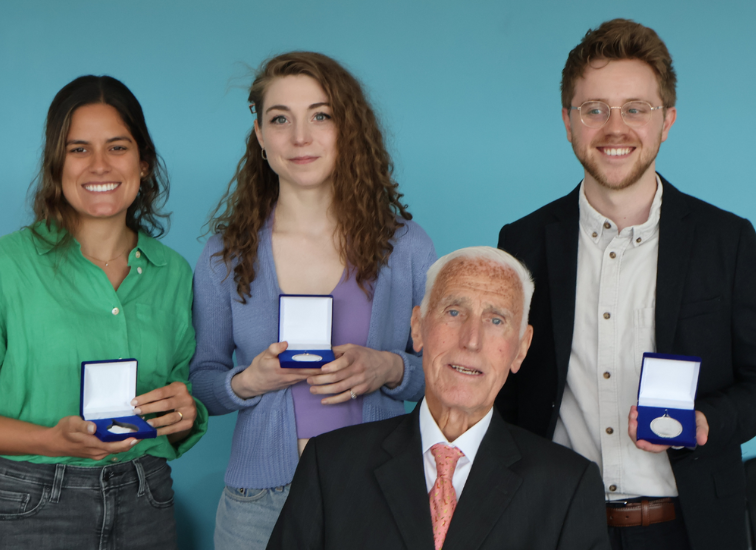The PhD Diaries: Doireann O’Brien & the Dermot McAleese Teaching Assistant Awards
My Path to a PhD in Economics
My name is Doireann, and I am about to begin my second year of a PhD in Economics. My path to the PhD began with a BA in PPES (Philosophy, Political Science, Economics and Sociology) followed by an MSc in Economics at Trinity. I became interested in economics as a teenager as I came to understand how fortunate myself and my siblings had been compared to our parents. For example, my grandparents, despite being relatively affluent, faced severe financial barriers to sending my dad to third level education. My dad only got to attend university because he won a scholarship from a large international oil company. This scholarship entailed spending months working away at sea on oil tankers in exchange for his tuition (although this does give him much better stories than I will ever have!)
As I progressed through my studies, this initial personal awareness broadened into an interest in the reasons why such grave economic disparities exist globally. Moreover, studying economics has instilled in me a knowledge that policies to address these inequalities need to be informed by rigorous research and evaluation. This is an area I hope to contribute to during my career.
Research: Does Banning Sex Selective Abortion cause Child Marriage Rates to Rise?
Now on the PhD, I have spent the first year of the programme working on my first paper under the supervision of Prof Nicola Fontana and Prof Selim Gulesci. This paper will explore the unintended consequences of a policy which banned sex-selective abortion in India, focusing on its impact on child marriage.
Sex-selective abortion, a practice driven by a preference for sons, has led to a significant gender imbalance in India and to the phenomenon of ‘missing girls.’ To address this, the Maharashtra state government implemented a ban on prenatal sex determination in 1988, which was followed by a national ban on the practice in 1996. Existing research indicates that such bans can be quite successful in balancing the sex ratio at birth. However, they can also result in important unintended consequences. For instance, previous research has shown that restricting access to sex-selective termination has caused increased rates of neonatal mortality for girls.
My research aims to extend this knowledge by investigating a possible rise in child marriages. The proposed mechanism through which child marriage may increase as a result of a ban on sex selective abortion is tied to the economic burden of raising daughters. The practice of dowry, a payment which is made by the bride’s family to the groom’s family at the point of marriage, has been implicated as a key driver of boy preference in India.
The financial strain caused by dowry can be impoverishing for the families of girls, as dowries often amount to 4-8 times the annual household income. With the option of sex-selective abortion restricted, parents may be forced to marry off their daughters at a younger age to cope with the dowry costs that they face. This is due to dowries tending to be lower for younger brides. Very early preliminary findings reveal a significant increase in child marriages as a response to the 1988 ban in Maharashtra, when compared with its neighbouring states which were not exposed to the ban.
Working as a Teaching Assistant on Economy of Ireland
As well as research, a core part of the PhD is working as a Teaching Assistant. Last year, I was the TA for the second year Economy of Ireland modules which cover Irish economic history as well as key topics in Irish policymaking today. Teaching on these modules was a fantastic experience and I learned a lot from it. I tried to ensure that tutorials had a respectful and non-judgemental atmosphere as I remember from attending tutorials myself that it can often be intimidating to contribute.
For the second half of the year, we trialled a ‘flipped classroom’ approach, where students would deliver presentations themselves during class. This resulted in nearly every student getting a chance to offer their thoughts, and it was great to see even quieter or more hesitant students get to hold the floor. The students were insightful and hardworking, and it was a real pleasure working with them. I was delighted to receive the Dermot McAleese Teaching Assistant Award for Economics this year working with Prof Ronan Lyons and Prof Francis O’Toole on these modules.
Looking forward
As I look forward to the next three years, I am deeply grateful to the donors of the Grattan Scholarship, who have enabled me to pursue these interests at PhD level. I am also cognisant of the reality that, sadly, doctoral research remains inaccessible for most due to severe financial barriers that are still being faced. I am hopeful that in the future, PhD candidates will receive a liveable wage and more secure conditions for their work as teaching assistants and researchers, as well as important protections such as maternity leave. These developments would open up this rewarding pathway to applicants from a more diverse range of economic backgrounds who can bring valuable perspectives to academia. Pictured are three of the award winners with Dermot McAleese.
Pictured are three of the award winners with Dermot McAleese.
Doireann O’Brien
Doireann O’Brien is a second-year PhD candidate in Economics.
She is in the early stages of the first paper of her thesis in which she hopes to investigate whether restricting access to sex-selective abortion increases the incidence of child marriage within the context of a ban in India.
Doireann hopes to pursue a career in empirical research, focusing on the areas of gender and development.

